Cardinal Connell's legacy prompts a challenging question

He was, almost unfairly, asked, in 1988, to be Archbishop of Dublin after a happy academic career stretching over 35 years during which he taught philosophy at UCD. He was entirely unsuited, and probably disinterested, in the challenge of pastoral work. The match was almost doomed from inception.
This challenge was made all the greater by the unfolding child sexual abuse scandals that he could not avoid. That scandal represented a level of bestiality that did not usually upset the settled backwaters of academia. His initial response, one of obfuscation, culminated in the shameful “moral reservation” deception, one which must cloud any judgement of his life and work. He did not acquit himself well but in time he came to a better, fuller understanding of the depth of the horrors of paedophile clerics, and acted accordingly.
















